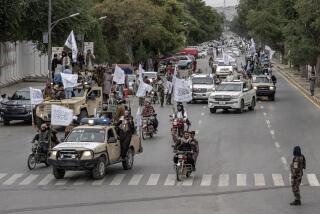Afghans fear U.S. drawdown will allow Taliban to regroup
- Share via
Reporting from Kabul, Afghanistan — President Obama’s planned drawdown of 33,000 U.S. troops from Afghanistan has generated ripples of anxiety for Afghans who worry that the Taliban will overwhelm the country’s inexperienced, ill-equipped security forces.
Many Afghans concerned about feeling abandoned by the U.S. are asking with some urgency, “Will we be ready?”
The country will see 10,000 U.S. troops leave by the end of this year, and the rest of the additional forces Obama dispatched to Afghanistan in late 2009 head out by September 2012. The U.S. combat mission is scheduled to wrap up by the end of 2014, when American and NATO forces will limit their involvement to training and equipping Afghan army and police forces.
What isn’t known despite Obama’s address Wednesday, Afghans say, is to what extent the Taliban insurgency’s fighting capacity will be diminished by 2014, or whether efforts to bring insurgent leaders to the negotiating table will bear fruit.
“The core Taliban group’s idea is to topple the system, to reverse the process,” Abdullah Abdullah, a former Afghan foreign minister and President Hamid Karzai’s main opponent in the last presidential election, told reporters in Kabul on Thursday. “They will continue that struggle; that’s very obvious.”
Haroon Mir, an Afghan political and security analyst, said many concerns involve what the Taliban may achieve by 2014, rather than in the next several months.
“We know the Taliban won’t amass a bunch of fighters because 10,000 U.S. troops have left this year, but in 2014, that might be the case,” Mir said. “People are afraid that the Taliban will return, and the Afghan security forces won’t be able to defend the country.”
Afghans acknowledge a substantial lack of confidence in the country’s security forces, which now number about 150,000 army troops and 122,000 police officers. Since 2009, there have been 16 cases of Afghan security personnel shooting and killing NATO troops and Western military contractors. An estimated 80% of Afghan police and army recruits cannot read.
Next month, Afghanistan is expected to assume security responsibility in two provinces, four provincial capitals and most of Kabul. One of those provincial capitals, Lashkar Gah in Helmand, has been the site of fierce fighting between coalition troops and Taliban insurgents. Even relatively quiet provinces like Bamian, also slated for a handoff to Afghan forces next month, recently have been hit by Taliban violence. This year, the beheaded corpse of the Bamian provincial council chief was found on a roadside.
Karzai welcomed Obama’s speech, saying the drawdown announcement signaled the start of Afghanistan’s self-determination.
“Every nation protects its own land, and Afghans can do it better,” he said in a statement. “We have proved it over the course of history, and we are proud of that.”
Nevertheless, Afghans say the drawdown probably will rekindle fear of a U.S. abandonment of the region akin to that of the early 1990s, when the Soviet Union collapsed and Washington no longer saw a need to nurture strong links with Afghanistan and Pakistan. Washington has said on numerous occasions that it will not make the same mistake, but Afghans remain unconvinced.
“America left us, and Afghanistan became a safe haven for terrorists,” said Samad, a manager of a Kabul wedding hall who, like many Afghans, goes by one name.
Experts say Afghans’ concerns about the drawdown will be eased if Washington ramps up its pressure on Pakistan to rein in Afghan Taliban militants who use Pakistan’s largely lawless tribal areas along the Afghan border as sanctuary from which to launch attacks on NATO and Afghan forces in Afghanistan.
Top U.S. civilian and military leaders have met with their counterparts in Islamabad, the Pakistani capital, on numerous occasions in an attempt to get Pakistan’s military to uproot Afghan Taliban fighters and commanders, particularly those that belong to the Taliban wing known as the Haqqani network, from their strongholds in the North Waziristan region. Pakistani military leaders have consistently refused.
When U.S. officials have raised allegations that elements of the Pakistani security establishment maintain links with Afghan Taliban militants in the tribal areas, Pakistani military and intelligence officials have steadfastly denied the charges.
Abdullah was among those who said Washington must succeed in prodding Pakistan to clamp down on militants if conditions are to improve in Afghanistan.
“What will happen to the support that the Taliban gets in Pakistan?” Abdullah said. “Will they still have training camps, bomb-making factories where they make IEDs used against the Afghan people and international troops? Whether the U.S. effectively uses its leverage with Pakistan to convince them that supporting the Taliban is not in their interest — this is a question.”
Special correspondent Aimal Yaqubi contributed to this report.
More to Read
Sign up for Essential California
The most important California stories and recommendations in your inbox every morning.
You may occasionally receive promotional content from the Los Angeles Times.










